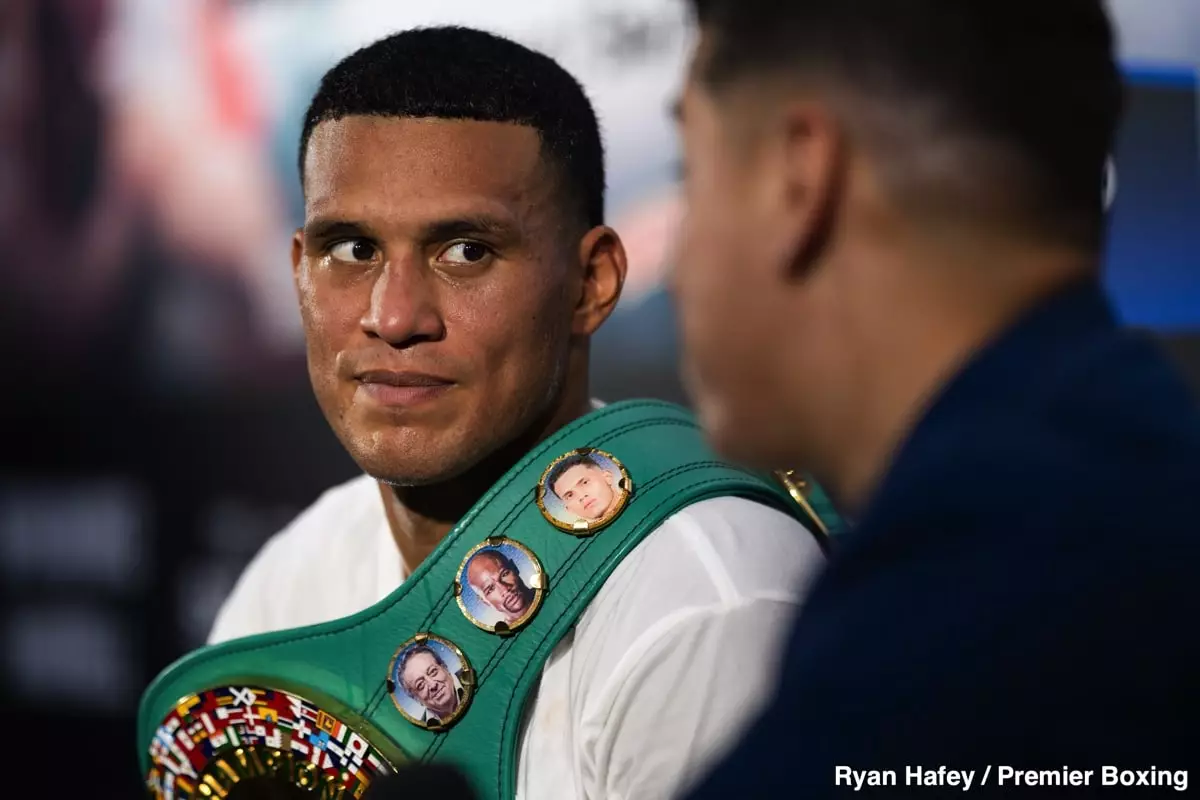David Benavidez’s recent grievances regarding Canelo Alvarez reflect not just personal ambition but spill over into the perilous realm of entitlement. With a record of 29 wins, 24 by knockout, Benavidez believes that a showdown with Alvarez would be monumental, potentially one of the biggest fights in boxing history. However, he seems to overlook an important aspect of the fight game: desires do not dictate reality. While he bemoans Alvarez’s decision to pursue other opponents, the question arises—has he become too fixated on a single fight to see the broader picture ahead of him?
Boxing, as a sport, thrives on aspiration and ambition. Fighters dream of monumental clashes that could etch their names into the annals of history. Benavidez’s insistence on a bout with Alvarez underscores an increasing trend among fighters: a sense of entitlement to opponents perceived as “superstar-level.” The narrative that Benavidez has painted hints at a craving for validation through this prestigious matchup. Yet, in doing so, he risks boxing itself—an ever-evolving sport that prioritizes strategy, timing, and sometimes, good old-fashioned luck.
It’s essential to recognize that Alvarez is at the pinnacle of the boxing world, often choosing opponents that resonate commercially and strategically with his brand. This isn’t simply refusing to acknowledge Benavidez; it’s also about making calculations that align with Alvarez’s career trajectory. For Benavidez to express bitterness instead of focusing on his own upcoming challenge merely reveals a flawed perception of how negotiations and relationships materialize at the elite level of the sport.
The WBC interim light heavyweight champion is set to clash against WBA ‘regular’ light heavyweight champion David Morrell on February 1st. This bout presents an opportunity that Benavidez should be embracing wholeheartedly. Defeating Morrell arguably positions him as a more tantalizing contender and may even make him a more viable opponent for Alvarez down the line. Benavidez needs to channel his energy into preparing for this impending fight instead of allowing his obsession with Canelo to cloud his judgment.
Should he lose to Morrell, the weight of his fixation on Canelo will emerge as a glaring distraction hindering his growth as a fighter. A potential defeat serves as an impending wake-up call—highlighting the reality that success in boxing stems from taking one step at a time, rather than leaping towards lofty aspirations without ensuring a solid foundation. Injuries notwithstanding, any semblance of a lackluster performance akin to his initiation into the light heavyweight division against Oleksandr Gvozdyk could spell disaster.
Benavidez’s lamentation over Alvarez’s choices reveals more than mere frustration; it underscores a deeper reflection on the dynamics of financial incentive in boxing. The allure of monumental payouts significantly shapes the landscape of professional boxing, often leading champions to gravitate toward less risky but high-reward matches. Benavidez’s argument that Alvarez is seeking easier fights highlights a common critique: fighters often prioritize financial gain over competitive integrity.
The winner of the Benavidez-Morrell clash could well find themselves in the limelight, squaring off against either Dmitry Bivol or Artur Beterbiev on February 22nd—a contest rife with potential commercial success. Therefore, the singular fixation on Canelo must evolve into a broader strategy that acknowledges the ramifications of each contest and competitor.
In the realm of boxing where legacy, profit, and competition coalesce, David Benavidez stands at a crossroads. His fixation on Canelo Alvarez represents an understandable yearning for growth and notoriety; however, it must be tempered with pragmatism and immediate goals. The fight game respects winners, and ultimately, the legacy one builds is forged in the ring with each strategic decision rather than by obsessing over potential future showdowns. In essence, for Benavidez, the message is crystal clear: fight what’s in front of you and let your performance speak louder than your frustrations.

